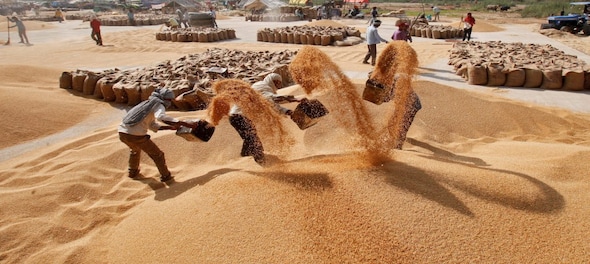
The Centre has prohibited export of wheat with immediate effect in the ‘interest of national food security’. A notification issued by the government on Friday night imposed the ban on fresh exports due to the crop damage caused by severe heatwave and a sharp rise in domestic food prices.
The notification issued by the directorate general of foreign trade (DGFT) said that the decision was taken in the interest of national food security after the sudden rise in the price of the food grain in the global market due to many factors. However, wheat export will be allowed in cases where an irrevocable letter of credit has already been issued before the notification. Export will be allowed on the basis of permission granted by the government to other countries to meet their food security needs based on the request of the governments, according to the notification.
Trade experts believe the ban will cool down the market prices of wheat that had soared past the minimum support price (MSP) in the recent months.
What is the reason behind the ban?
Several internal factors such as a record low procurement of wheat by the government agencies, low yield in major wheat producing states due to extreme weather conditions, rising wheat prices and spiralling inflation could be behind the government’s decision to ban wheat export with immediate effect.
In earlier months, a large quantity of wheat was purchased by private players at rates above the MSP that led to an increase in market prices of wheat as farmers preferred to sell their wheat in the open market. Indian traders are believed to have contracted to export around 4 million tonnes of wheat in less than two months, and about 1.2 million tonnes have already been shipped out. Many farmers also held back their stock waiting for the prices to go further up.
What will be the impact of the wheat export ban?
Due to the soaring demand and higher prices offered by private traders, a shortage of wheat has caused a spike in wheat flour prices in the domestic markets in the last few weeks. As per reports, all India monthly average retail price of wheat flour (atta) was Rs 32.38 per kg in April, the highest since January 2010.
The ban on wheat export will help to calm down the market prices of wheat and bring it closer to the MSP. This may further bring down the prices of wheat flour in the market and help the consumer absorb the brunt of rising inflation.
The measure taken by the Centre would help the government agencies to boost its procurement from states where it has been lagging. Private traders will also be forced to free up their stockpiles that were held in anticipation of further rise in prices. This is likely to result in a drop in market prices of wheat. According to reports, an estimated 1.4 to 2 million tonnes of wheat is currently being held by traders.
Some experts, however, have deemed the decision as an anti-farmer move. The government could have gradually filtered exports rather than resorting to a knee-jerk ban. A minimum export price (below which shipments cannot take place) or a tariff could have been introduced to help farmers earn more while calming down the market prices, according to agricultural economist Ashok Gulat, the Indian Express reported.
Government’s U-turn on export ban
The move may likely attract criticism over the about-turn in policy as Prime Minister Narendra Modi made a statement regarding “feeding the world” in the wake of the Russia-Ukraine war a few weeks earlier.
Last week, amid the speculations of a ban on wheat export food secretary Sudhanshu Pandey had claimed that there was no plan to control exports.
“We estimate 60 lakh MT less production of wheat this year. From the overall grain management side, still the government is in a surplus situation. Due to rise in market price and higher private demand, purchase by government agencies is less. The farmers are getting a good price and they are only selling to the government what they could not sell in the market. Don't see a reason to control exports, only 10 lakh MT exported, contract for first quarter is 40 lakh MT,” said Pandey.
“Wheat export is already taking place, there's no curb and the government is enabling additional market access to exporters,” claimed Pandey.
(Edited by : Sudarsanan Mani)
Check out our in-depth Market Coverage, Business News & get real-time Stock Market Updates on CNBC-TV18. Also, Watch our channels CNBC-TV18, CNBC Awaaz and CNBC Bajar Live on-the-go!


Kolkata North: TMC fights 'TMC' in battle reflecting party's Old vs New debate
May 10, 2024 5:14 PM
Mani Shankar Aiyar does it again, sparks controversy with remarks on Pakistan's nuclear capability
May 10, 2024 4:57 PM
AAP leaders say last chance to save democracy; thank SC on granting interim bail to Kejriwal
May 10, 2024 4:19 PM
₹1 lakh to each woman, ₹2 lakh if you have two wives, says Congress leader
May 10, 2024 2:44 PM

